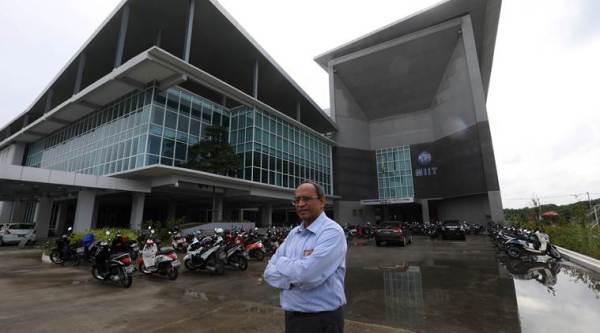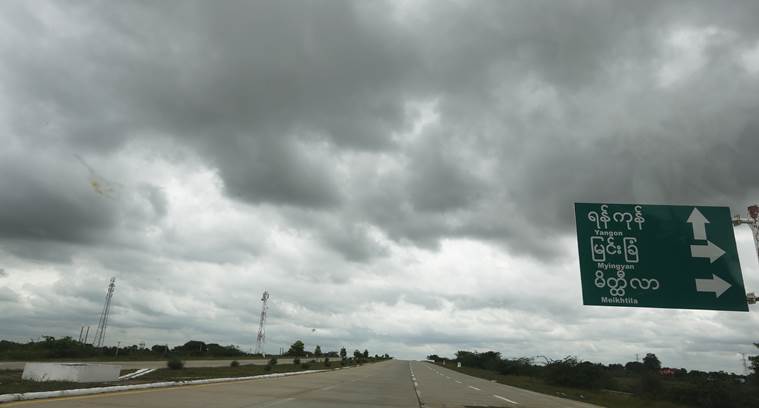China hardsells big ticket but low on trust, India’s soft power push in Myanmar education and health
As Delhi seeks to expand its engagement with Myanmar, it is in sectors such as education, health and entertainment services that India hopes to make an impact in a country crowded with several international players, and completely dominated by China.

K R V Subramanian, Director of the Myanmar Institute of Information and Technology, at the campus. (Express Photo/Neeraj Priyadarshi)
In a state-of-the art classroom at the steel and glass Myanmar Institute of Information Technology (MIIT), Usha Subramanian is taking a class on Java for computer science students. Subramanian works the smartboard through her computer as she speaks about “hierarchies”. There is video conferencing equipment and all the 120-capacity classrooms are fully digital. Like Subramanian, there are 10 other faculty members from India, who work alongside 75 Myanmar faculty.
The MIIT, modeled on the Bangalore IIIT, is India’s $25-million gift to Myanmar set up in 2015 following an agreement in 2012. Director K R V Subramanian says the institute will be handed over to Myanmar in another year, when the MoU ends, unless the agreement is extended. The Institute will see off its first batch of graduates in October 2020.
As many as 1800 students wrote the entrance exam for 120 places last year. The students pay a fee of Kyat 5,000, or Rs 240 per month. Subramanian, who studied and taught at BITS Pilani, before moving into the IT industry and setting up his own education software company, says it is his goal to get companies for campus placements as in India. Myanmar faculty do a stint in Bengaluru to make them familiar with teaching and research methods.
“The structure, the process, the organisation, and the academic philosophy, will all serve as a model for other universities in Myanmar,” says Subramanian, who said there were challenges, the chief among them the language barrier and Myanmar’s 11-year school system, but “everything will fall in place”.
As Delhi seeks to expand its engagement with Myanmar, it is in sectors such as education, health and entertainment services that India hopes to make an impact in a country crowded with several international players, and completely dominated by China.
In Yangon, a three-day exhibition of Indian health services is underway at the Tatmadaw hall, with stalls set up by Indian companies manufacturing medical equipment, medicines, as well as by hospitals. “We are planning that a delegation from Myanmar should visit Bollywood to see for themselves the range of production services it can offer,” said an official at the exhibition.
Religious tourism, that is pilgrimage to Bodh Gaya, is seen as another important sector with potential. But Indian interest in Myanmar has been slow to pick up. Indian businessmen at the exhibition talk about the “great potential” in one breath, and in the next, about the small market the country offers, the low purchasing power of consumers, and the absence of adequate air and good land connectivity between the two countries.
India’s big-ticket infrastructure projects, such as the Trilateral Highway, and the Kaladan Multinodal project, and the pace of their execution, pale in comparison to what China and Japan are engaged in.
In a small consulting room at the Aye Chan Thar hospital that he owns, Dr Maung Maung, who is also the Secretary General of the Mandalay Region Chamber of Commerce and Industry, explains that he loses no opportunity to promote good relations between India and Myanmar, and that is why he must first explain what China is doing in Myanmar.
He takes a sheet of paper, and with a practised hand, draws out Myanmar, marking Mandalay, Yangon, and Kyaukpyu, the port and SEZ that China is developing in the north-western state of Rakhine. He connects the three in an inverted V. From Mandalay, he draws a line east to Ruili, in China’s Yunan province bordering Muse in Myanmar, to Kunming, the Yunan capital. Now it looks like an inverted Y. “That is China’s Y project in Myanmar — it’s roads, railways, a port, everything,” he says. China and Myanmar are said to have already finalised a 15-point MoU for the Y project, which will give Beijing access to the Bay of Bengal through Myanmar.
There is already a gas pipeline and running parallel to it, an oil pipeline from Kyaukpyu to Kunming. The Mandalay-Muse route is roaring with traffic as Myanmar traders stampede to the Chinese border town for Ruili.. “If you leave Mandalay in the morning, you can reach Muse by 6 pm. The transportation is very easy. There are plans to make it an expressway. The border pass is very easy to get, and you can cross over for upto seven days. I have heard the Chinese government is going to make this even easier,” he said.
Planned en route the proposed China-Myanmar Economic Y Corridor are a host of other projects as part of China’s Belt and Road Initiative in which Myanmar is a participant.
Compared to the two way India-Myanmar trade of about $1.6 billion, Myanmar-China trade is over $8 billion. China has remained the biggest investor in Myanmar. As of July 2018, its investments were worth over $20 billion, while India was the 11th biggest investor with $763 million. China accounts for over a quarter of foreign investments in Myanmar, and Singapore, the second biggest investor with $19 bn, another quarter. Hong Kong is the fourth biggest investor after Thailand, and has invested about $7.8 bn.
Maung Maung says China-Myanmar trade is “very big and very profitable” for both sides but still, “Myanmar people do not trust China”. “We buy Chinese medicines but we, professionals, and even the people, they know that these are not good medicines. We buy agricultural machinery from China because it’s cheap, but it’s low quality. Indian is better quality but slightly more expensive; Japanese are the best, and they are the most expensive, we cannot afford them.”
In recent months, China has emerged as an isolated Myanmar’s foremost ally on the Rohingya issue but the distrust remains, and is everywhere, from the chamber of commerce to journalists, politicians and the man on the street.
In recent months, China has emerged as an isolated Myanmar’s foremost ally on the Rohingya issue but the distrust remains, and is everywhere, from the chamber of commerce to journalists, politicians and the man on the street.
By comparison, India evokes friendlier sentiments because of State Counsellor Suu Kyi’s old connections to it even though New Delhi built ties with the Myanmar military from the late 1990s, former Defence Minister George Fernandes’s activism for democracy in Myanmar, and Bollywood. Everyone has seen a Bollywood film, even though not all can remember the names of the movies or the actors.
A Yangon cabbie says “China knows take, it does not give”. Chinese businessmen have a negative image in Myanmar as “people who are making money out of Myanmar people”. All that came to the fore over the last few months when Myanmar’s wariness about falling into a debt trap with China of the kind Sri Lanka found itself in over Hambantota led it to scale down the Kyaukpyu project. According to reports, the deep sea port, initially a $7.9 billion project for 10 berths, has now been scaled back by Myanmar to a $1.3 bn for two berths.
In 2012, when Myanmar’s military junta was gradually giving up some of its powers, one of its big moves for legitimacy was to suspend the Chinese-funded Myitsone dam project under pressure of public opinion.
It is not just Chinese investments and economy that evoke suspicion. It is also the perceived Chinese role in Myanmar’s peace process with “ethnic armed organisations” (EAOs), which began in 2015 but has not seen much forward movement since the signing of the ceasefire.
It is not just Chinese investments and economy that evoke suspicion. It is also the perceived Chinese role in Myanmar’s peace process with “ethnic armed organisations” (EAOs), which began in 2015 but has not seen much forward movement since the signing of the ceasefire.
“Our civil war is not just a domestic issue, it is connected with our neighbouring countries, and regional politics, which makes it more complex,” says Ko Ko Gyi, leader of the newly founded People’s Party, in an interview at this party office in Yangon. He spoke about the Chinese influence on the Northern Alliance, whose four members are the Kachin Independence Army (KIA), Myanmar National Democratic Alliance Army (MNDAA), Ta-ang National Liberation Army (TNLA), and the Arakan Army (AA). “When the Chinese ask them to jump, they jump, when China asks them to be quiet, they are quiet”.
Toe Kyaw Hlaing, who participated in the student uprising against the military in 1988, says the continuing Chinese proximity to the military has affected business and politics in the country. “China is playing a major role in the peace process because it has great influence on the Northern Alliance. The Chinese are playing a lot of games here with businesses, with political parties and the EAOs,” he said.
 A stretch of the newly constructed India -Myanmar-Thailand Trilateral Highway. (Express Photo by Neeraj Priyadarshi)
A stretch of the newly constructed India -Myanmar-Thailand Trilateral Highway. (Express Photo by Neeraj Priyadarshi)





































No hay comentarios:
Publicar un comentario